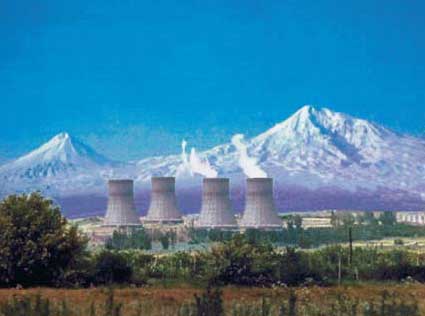


ArmInfo. Armenian AEP has a determined role for NPP Armenia, Karen Harutyunyan, Armenian NPP General Director stated to ArmInmfo reported.
According to him, if the plant stops working for 15-20 days, the company gets energy power from thermal generation facilities at an expensive price tariff. As a result, the financial resources of the networks instead of getting profit are directed to the solution of this problem. "In short, AEP functioning is very important for the company, "Karen Harutyunyan said, expressing hope that the policy implemented by the Armenian Government and Rosatom will be favorable for the company.
He also pointed the importance of stopping the station for scheduled preventive outage and refueling in May-July, when there are no problems with water in the Republic, and there is an opportunity to purchase energy from hydropower facilities. Besides, in order to replenish the capacity of NPP, stopped from May 10 to carry out repairs, energy supplies will be implemented from neighbor Georgia. "The stop time of the Armenian Nuclear Power Plant for scheduled preventive outage and fuel refueling was chosen not accidentally, it was done to minimize pressure on the tariff for terminal users. Everything is done for the repair work at nuclear power plants, which share in the country's total energy power balance is about 30%, to be implemented with maximum efficiency, "- NPP General director stressed.
In his turn, Armenian Energy network JSC Directors Board chairman Karen Darbinyan reminded that thanks to implemented work on the plant, the term of N2 energy bloc exploitation of AEP will be prolonged for 10 years. And that means stable energy processing for a long period on available price. To recall, on May 10 AEP is stopped for the term of 60 days to implement scheduled preventive outage and refueling. Within these works events will be held to prolong N2 energy bloc exploitation term.
Earlier, during his interview with ArmInfo correspondent, AEP N2 energy bloc term prolongation works head said, that a considerable amount of work will be carried out during the preventive maintenance. The main focus will be put on the safety of the nuclear power plant: works related to the repair of equipment will be performed, as well as work on instrumental inspection of equipment. The repair of the equipment will be assisted by employees of the Kolskaya and Novovoronezh nuclear power plants - they are the ?twinning? stations of the Armenian NPP, scientific management will be carried out by JSC TsNIITMASH, an industrial enterprise of the Rosatom. As for the instrumental survey, the main task of this exercise is to calculate and confirm the residual life of the equipment using non-destructive testing methods. In simple words, it is necessary to check the possibility of further operation of NPP equipment. As you know, there is a lot of equipment on the NPPA, so the instrumental survey is distributed for several years, without compromising the safety and operation of the NPPA. Last year, we started this process; this year the volume of the surveyed equipment increased by 50% compared to last year (150 types of equipment) at the request of the supervisory authority. We hope to finish the instrumental survey process next year and in 2019. Transfer calculations and conclusions to the supervisory authority - the State Committee for Nuclear Safety Regulation. We hope to finish on time, but everything will depend on the results of the survey and the decision of the Gosatomnadzor. On 30 Sept 2015, Tashir Group headed by Russian businessman of Armenian origin Samvel Karapetyan and Inter RAO signed an agreement of purchase and sale of electric power assets of the Russian energy holding in Armenia - ENA CJSC and Hrazdan TPP. The reason of the sale was the public discontent about the ungrounded growth in electricity prices by approximately 16.7% (6.93 AMD per 1 kWh). The Public Services Regulatory Commission's (PSRC) decision to raise the tariff sparked protests and the Armenian authorities agreed to audit both the expediency of PSRC's decision to raise the tariff and the activities of the Electric Networks. In addition, the authorities and Tashir Group took a decision to subsidize on a parity basis the raised tariff for the households and SMEs until the audit is completed. Since August 1, 2015, the daytime tariff for households (from 7 am till 11 pm) has been 48.78 AMD per 1kWh, while the nighttime tariff has been 38.78 AMD per 1 kWh.